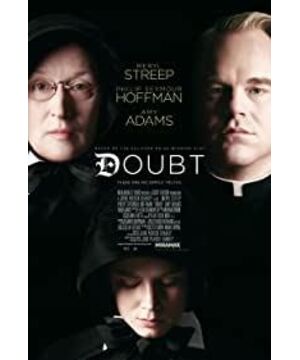Not to mention the superb acting skills of a few old actors (this film is called an acting textbook), I can't help but sigh, this is the actor, right? I mainly want to talk about the theme of the film - "doubt", the devil of the mind.
Spoiler first, briefly explain the outline of the story: #### A militarized church school, with a conservative and ruthless nun as the principal, a new priest who is passionate and loves life as the leader, how the nun sees the priest and why does not Pleasant to the eye, the "framed" priest who made up the facts by chasing other stories and fabricated facts sexually assaulted the only black child in the school, and eventually the priest was kicked out. ####
A very simple story that deeply portrays "doubt" to the bones. Aunt May was nominated for Best Actress at the Academy Awards for playing the principal of the nun in this film. Those eyes, those mean lips, when the priest asked her why she doubted herself without proof, the nun said only "I know people". . . . The priest, played by Philip Seymour Hoffman, shivered with anger, but couldn't refute it. You can refute a person's logic and reasoning, but you can't erase the doubts in your heart.
Seeing this, I accidentally "substituted" again. . . Our lives are full of Sherlock Holmes. When you take a nap with your family, someone else may have connected several "clues" to make a series, and when you wake up, you will be confused "come on! what" happened?". I used to wonder where all the right and wrong came from, but now I finally know that it may not be what really happened, but the human mind. When someone has become a target, anything he does can be very creative. was made into a blockbuster movie.
Writing here, I must say that at the end of the movie, the principal nun was crying under the tree, shouting loudly: "I have doubt! I have doubt!". . . She was very painful in her heart. She drove away the priest, but she actually knew that she was guilty and inferred before going after the wind and repenting deeply. . . Some netizens say that she has a good conscience, but I think she is very pitiful. Everything is a farce written and acted by her. The priest is gone, but I think this nun is a lunatic, and the priest is a cheerful person. I will continue. good his life. But the nun who drove away the priest was still in pain, because it was the devil in her that was causing her pain. Revenge and punishment, hurting others can't alleviate a person's pain, only oneself is the ultimate redemption.
Let's end with Robert's Rules of Order. "Don't question motives—you can't question the motives of others in the name of morality." Why can't you question the motives of others? "Robert's Rules of Procedure" believes that: first, the motive is unprovable; second, it is not a person but a matter to be considered, and the suspicion and disclosure of the motive itself is a deviation from the issue; third, self-interest is the common nature of human beings. Under the premise of not infringing on the interests of others and society, it is not an exaggeration to pursue the maximization of interests, and it is meaningless to blame others for their motives. Since the motive is unprovable, all speculation will be meaningless and will reflect all kinds of unbearableness in itself. So why do so many people always naturally question their motives?
View more about Doubt reviews











